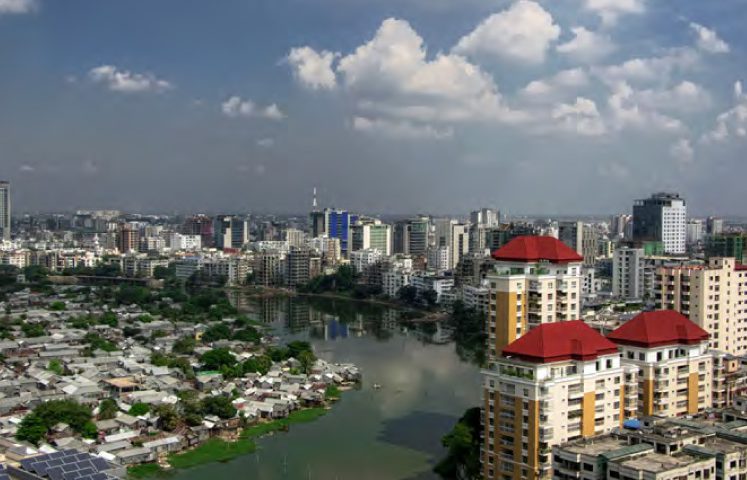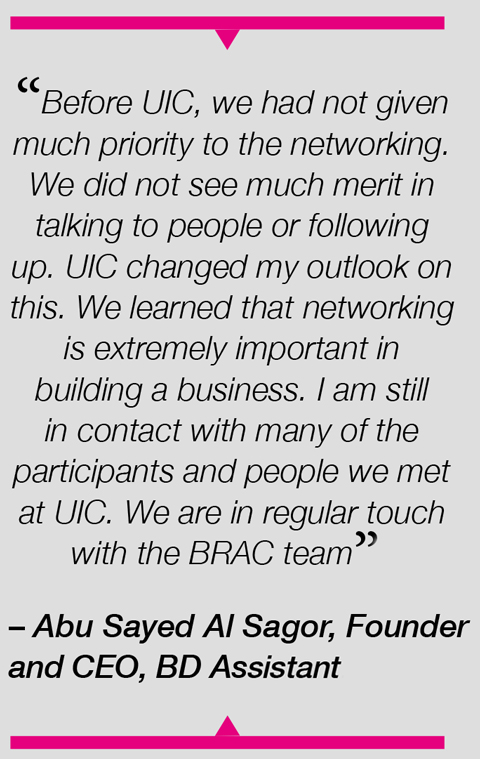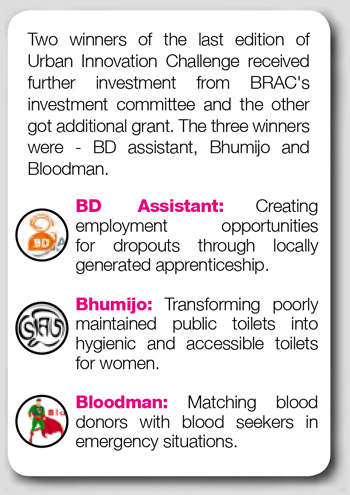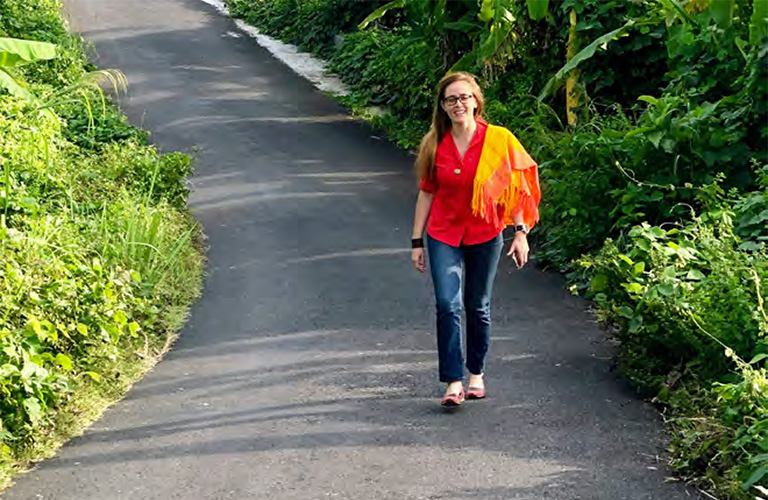Our cities, our solutions

Bhumijo and the journey of a young entrepreneur
March 14, 2019
Self-identity, aspirations and expectations of Bangladeshi youth
March 19, 2019Our cities, our solutions

 Thousands of innovations are blossoming every day in Bangladesh where people solve problems with the resources available to them. Solutions of dayto- day problems come from people who are practically living in it and yet managing to develop innovative approaches of tackling issues at hand.
Thousands of innovations are blossoming every day in Bangladesh where people solve problems with the resources available to them. Solutions of dayto- day problems come from people who are practically living in it and yet managing to develop innovative approaches of tackling issues at hand.
BRAC has created the ‘Urban Innovation Challenge’ (UIC), platform for young innovators who are ready to bring radical approaches to age-old problems, and in the process, playing a role in making Bangladesh the next big thing in innovation. The platform has made it viable for innovators to test their solutions across the cities of Bangladesh.
The organisation has more than four decades of scaling what works and its workforce realises how contextualisation of problems plays the most important role in coming up with solutions.
After the successful completion of the first ever Urban Innovation Challenge in 2016, BRAC launched the Urban Innovation Challenge 2.0 in August 2018. BRAC called out for ideas with the tagline “Our cities, our solutions” for young innovators who are pumped to solve pressing issues of urban Bangladesh in five different sectors: climate change, healthcare, low cost urban housing, renewable energy and water, sanitation and hygiene. The objective was to challenge innovators to come up with scalable solutions rather than fancy ideas that look good only on presentation slides. With thousands of people pouring into cities for better opportunities each day, urban spaces are increasingly facing new problems and challenges to deal with. The idea is to encourage young minds to get close to the problem and people, and then incubate and test out their ideas in the field, and iterate along the way.
So how is Urban Innovation Challenge different from other events or challenges? To begin with, it does not end at the final pitch where winners are given out prize money. Rather, after the final pitch, a six-month-long incubation period starts with seed funding from BRAC. Access to BRAC’s network of operations and partners is a unique opportunity for innovators to test their solutions. They also get connected to mentors. BRAC makes them prepared for investment pitch before its own investment committee and other investors. Throughout, the platform is focused on real-life experiences rather than technicalities.
The reach across Bangladesh was ensured through campus activation by different university clubs and faculties.
Applications both in English and Bangla were encouraged. For Urban Innovation Challenge 2.0, BRAC received around 300 applications and among them 25 were direct submissions by the start-up community in Bangladesh.
The platform also creates a space to gather knowledge about BRAC’s required experience of over four decades. BRAC provides perticipants with mentorship support, investors and partnership ecosystem required to flourish their business ideas.
The teams went through initial screening, boot camp, human-centred design, final pitch and incubation. After conceptualisation of their ideas, 13 teams were selected to pitch their projects in the final round this year. From there, seed funding was declared for six winners. The winners were City Bird, Nirvana, Jotno Healthcare, Onushongo, Responsive Urbanist and DrinkWell.
These teams focused on different sectors and urban issues that need innovative solutions.
Six months of incubation includes building proof of concept (materialising idea into reality), prototyping (low-cost early model or experiment to rapidly create solutions to challenges), external network and resources, and getting ready with their investment pitch.
BRAC makes sure that the entrepreneurs find relevant information and feedback from its field staff. The objective is to urge them think about sustaining their ideas and how scaling and networking are going to be vital for their initiatives to flourish.
- City Bird – Leveraging the idle rooftop solar panels to power residential water pumps in lifting water from ground level to overhead reservoir.
- Nirvana – Creating an affordable cooking solution for households through its designed digester, Lasiter. This digester is installed on rooftops and uses collected kitchen waste to produce gas for household supply.
- Jotno Healthcare – Ensuring delivery of authentic diagnostic and digital primary healthcare services to the doorsteps of patients through the use of Jotno Healthcare Box. The unit is equipped with the Jotno mobile app and point-of-care testing devices with the capability to diagnose through 70+ vital pathological tests.
- Onushongo – Designing and constructing multi-purpose service points in urban slums that offer common facilities for cooking and washing. Onushongo develops master construction plans for slum development with the aim to avoid displacement that can accompany gentrification.
- Responsive Urbanist– Designing and installing a rainwater harvesting system in public spaces to address the demand for clean drinking water for migrants in financial crisis.
- Drinkwell – Offering turnkey water solutions via metered water ATM dispensing systems. The system uses RFID-enabled pay-as-you-go cards, leveraging mobile money platforms to enable utility companies to provide safe drinking water in hard-to-reach areas.
BRAC has already welcomed the second version of solution-focused thinkers. It is time to see how the incubation phase goes for them and who convinces BRAC to get the opportunity for further investment.
Nishat Tasnim is a research and insight specialist, BRAC Social Innovation Lab.

